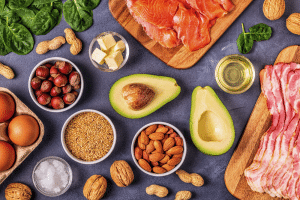
There’s a lot of misinformation about weight loss out there. The truth is, many of us want to lose weight, and it doesn’t have to be complicated. The simplest way to a healthy weight is eating a balanced diet and exercising regularly. That’s it! If you’ve heard any of these weight loss myths, consider them debunked.
Diets Work
Diets can work, but just because a new fad diet starts going viral on social media doesn’t necessarily mean it will work for you. Sure, there’s nothing inherently wrong with Atkins, paleo, keto, or Whole 30—if you can sustain it. The problem is that most people think diets promise a quick solution to their weight loss problem, when in reality, only long-term lifestyle changes will sustain weight loss over time.
If you’re trying to lose weight, focus on less dramatic, incremental changes, like daily exercise or gradual diet change, rather than going all-in on a diet for a few weeks. Yo-yo dieting, or gaining and losing pounds frequently due to diets, actually causes you to gain weight over time.
Carbs Are Bad
Carbs get a bad rap, but they’ve been enjoyed for far longer than the obesity epidemic has been going on, so they really shouldn’t take all the blame. The truth is, depending on your biology, a low-carb or low-fat diet might be more effective for you.
You don’t have to eliminate carbs entirely, but try to stay away from refined carbs, like sugar, since these do cause you to gain weight.
Counting Calories Matters
You wouldn’t think a 100-calorie scoop of ice cream was equally as healthy as a 100-calorie scoop of hummus, would you? When it comes to counting calories, the quality matters just as much as the quantity. Simply focusing on consuming as few calories as possible won’t help you lose weight if the calories you’re eating are made up of unhealthy fats, refined carbs, or sweets.
You Can Eat Anything You Want If You Exercise
Exercise is an important addition to any healthy lifestyle, but it’s not the only thing that matters. Yes, exercise burns calories—a lot, depending on the activity! But it takes a lot of energy to exercise, which can make you disproportionately hungry. In fact, some people actually gain weight when they exercise, since they eat more calories than they burn!
Don’t be afraid to indulge every once and awhile after a strenuous exercise, but don’t completely ignore your diet when you workout either.
Snacking Makes You Gain Weight or Lose Weight
Some people subscribe to the idea that 6 meals a day are better, while others try to avoid snacking completely. The fact is, it doesn’t really matter how many times a day you eat as long as you’re making healthy choices.
For some people, snacks between meals help prevent them from overeating at mealtimes. Other people might snack out of boredom instead of hunger, which could cause weight gain. The total amount you consume each day matters more than when you eat, so if you’re hungry, grab a healthy fruit or vegetable and go on with your day!
While we’re busting myths, just remember: weight is just a number. Mental health, dietary choices, exercise, relationships, and many other factors make up a “healthy” life, so try not to obsess over the number you see on the scale!



